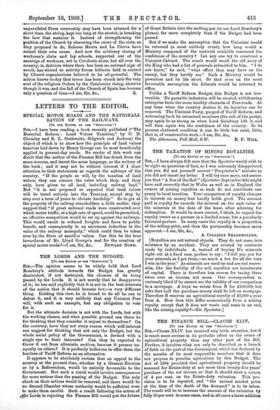THE TAXATION OF MINING ROYALTIES.
[To THE EDITOR OF THE " SPECTATOR."] SIE,—I have always felt sure that the Spectator would wish to be right on questions of fact, so I was extremely disappointed that you did not yourself correct " Proprietor's " mistake as you did not insert my letter. I will try once more, and assure you that " A Son of the Soil " (Spectator, September 4th) might have said correctly that in Wales as well as in England the owners of mining royalties as such do not contribute one penny to local taxation. Your comparison of royalty charges to interest on money lent hardly holds good. The amount paid in royalty far exceeds the interest on the cash value of the minerals at the date of the lease, after allowing for redemption. It would be more correct, I think, to regard the royalty owner as a partner in a limited sense, but a peculiarly favoured partner. In many cases the royalty is a proportion of the selling-price, and then the partnership becomes more apparent.—I am, Sir, &c., A COLLIERY SHAREHOLDER.
[Royalties are not natural objects. They do not come into existence by an accident. They are created by contracts made by individuals. A, instead of buying B's minerals right out at a fixed sum, prefers to say " I will pay you for your minerals as I get them,—so much a ton for all the tons I win in the year." As minerals are used up and are not renew- able, like the fertility of the soil, royalties are instalments of capital. There is therefore leas reason for taxing them twice over as income, not more. Our correspondent is curiously blind if he cannot see the validity of our comparison to a mortgage. A buys an estate from B for 2100,000, but asks that half the purchase-money shall be left on mortgage. Therefore B receives an agricultural royalty of 22,000 a year from A. How does this differ economically from a mining royalty except that it does not waste and come to an end, like the mining royalty P—ED. Spectator.]










































 Previous page
Previous page